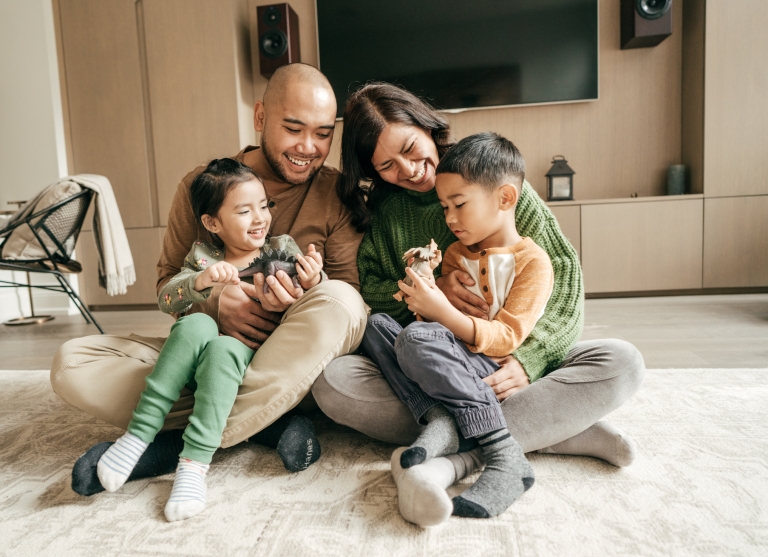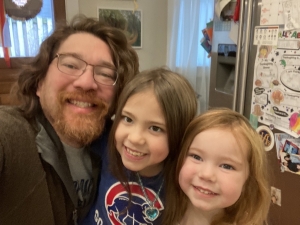7/25/23 blog post
breaking stigmas together: 5 personal stories of overcoming mental health stigma
raising awareness for Minority Mental Health Month

While 57.8 million Americans experienced mental illness in 2021 according to the National Alliance on Mental Illness (NAMI), experts say that minority communities are disproportionately impacted by mental health challenges when compared to the general population. Recent research has found:
- Black females, in grades 9-12 were 60% more likely to attempt suicide in 2019 compared to their non-Hispanic white peers.
- Suicide was the leading cause of death for Asian/Pacific Islanders ages 15-24 in 2019.
- People who identify as being two or more races are most likely to report any mental illness within the past year than any single race/ethnic group.
For National Minority Mental Health Month, the On Our Sleeves experts wanted to have a conversation about stigma to get a glimpse into these historically underrepresented communities and listen as they shared their personal experiences regarding mental health. As we work to break mental health stigma, it is so helpful to reflect on the challenges and barriers that some face to achieve this important goal. It is also helpful to see how other people may have similar experiences to our own and realize we don’t have to go through this alone.
We had five willing community members who shared their stories with us:
- Mekayla Pullins is a community health worker and a mother of two young children.
- Deena John is a public relations expert and community leader.
- Synthia Copher is a community health worker manager and mother of two.
- Erich Koehnig is a Computer Information Sciences expert and father to two young girls.
- Tazeen Ahmed is a Program Coordinator for Health Policy & Equity with the Montgomery County’s Alcohol, Drug Addiction and Mental Health Services
These personal stories shared are intended to provide individual perspectives and experiences on overcoming mental health stigma within diverse communities. It is important to note that these stories represent the unique journeys of the individuals interviewed and may not reflect the experiences of every member within the community. We hope that our readers approach these stories with an open mind and maybe even discover more about the individual nature of mental health challenges and journeys and what connects us all together.
In their own words: exploring personal experiences with mental health
The U.S. is facing a mental health crisis and there are millions of people who need support to be their best selves. At the same time, there are also recognized and researched barriers for people in diverse communities that impact their mental wellness. We discussed with our five community members their personal experiences with mental health and how stigma has impacted their journeys to mental wellness. They each brought up unique examples of how some in their community may have not recognized mental health challenges, how a seeming lack of belief in mental health counseling affected responses to mental health and how situations contributed to inaccessibility to mental health counseling.
1. recognition of mental health challenges
Some of our community members shared that they experienced the stigma and assumption within their communities that therapy, or mental health services were only for people who were experiencing more “severe” mental health challenges and crises.
“Growing up in the '80s, mental health was viewed in our house as either ‘crazy’ or ‘depression,'” shared Erich. “Feelings of anxiety or sadness were rarely recognized and even more rarely discussed.”
Many shared that mental wellness didn’t come up in regular day-to-day conversations within their homes.
"Within my own family and the families of others I have known, there has been a prevailing belief that discussing certain topics was considered taboo, a sign of weakness or laziness, and even seen as an excuse to avoid responsibilities,” explained Deena. “When I moved to North America, being exposed to different mental health-focused organizations – including ADAHMS and the Dayton Children’s On Our Sleeves team – helped me realize that mental health is influenced by various factors. And that there are medical science-based treatments available, similar to seeking medical help for physical conditions.” shared Deena.
2. a lack of belief in mental health counseling
In addition to only talking about mental health when it was a “serious problem,” some of our community members say that there was also a lack of belief in the usefulness of professional counseling.
“I was told to just pray about it,” said Synthia. “While I do think that faith and prayer are great protective factors for me, I understand that God wants us to find other solutions that may help us."
Synthia says she learned about the importance of mental wellness herself by having to advocate for her own child.
“Kids with chronic health conditions often miss out on events and activities because of their
illness so they need even more support to focus on their mental wellness. It was hard to break that stigma around mental health in my community, but it was worth it to get my daughter the help she needed,” shared Synthia.
Some have decided to lead by example and start conversations around their own mental health to help build trust and establish positive connections with mental health.
“I’ve become open about my journey with being in counseling and I talk about it with my family,” says Mekayla. "While most are supportive, some are confused that I’m in counseling, because in their minds counseling and therapy is only for those with severe mental illnesses.”
3. inaccessibility of mental health services
Accessing mental health care services can be a challenge for people of all backgrounds. But research has shown that people from diverse communities are less likely to seek mental health services for themselves. This could be for many different reasons, but our community members say they’ve personally seen these barriers within their own families and communities.
- A lack of transportation
- No WiFi or minutes on their phone to attend telehealth sessions or make an appointment
- No spare time to attend therapy sessions
- Financial struggles that kept them from affording therapy sessions
- Long waiting lists
- A lack of trust in the healthcare system
- Language barriers to receiving help if English is not the first language.
breaking the stigma for future generations
Breaking the stigma and moving towards better outcomes for future generations looks different for everyone. But the community members that we spoke to were open about how they plan to move forward and make a change.
“I believe that talking with my daughters about mental health is important because it shows that the world is truly diverse. Not everyone is gifted in the same ways, and we all struggle with our abilities and disabilities,” explains Erich.
Others are drawn to working in the field to make a difference.
For Tazeen, while seeing the lack of mental health professionals that identified the same way as her she says she felt drawn to learning more about suicide prevention and eventually became a prevention specialist and Senior Program Coordinator of
Health, Policy, and Equity at ADAMHS. Today, she is breaking the stigma around mental health by bringing awareness to mental wellness and learning what that looks like within communities that share the same cultural background and/or faith as her.
“Together, we are creating our own traditions and making mentally health choices that will hopefully have a lasting impact on our own family for generations to come,” says Tazeen.
an action plan for change: advice for adults on breaking the stigma
Adults have a special opportunity to impact the children in their lives and make sure that the next generation doesn’t continue some of the same cycles of stigma around mental health. Here are some ways that the interviewees say parents, caregivers and other caring adults can end mental health stigma in their communities.
- “Set an example by practicing mental wellness and self-care yourself.” - Mekayla
- "Have continued and open dialogue and discussion.” - Synthia
- “Continue the discussions because raising awareness and normalizing these conversations can have a life-saving impact on individuals” - Deena
- “Get to know your child and their own culture. Each generation has different obstacles and barriers so take time to learn about what your child is going through and their unique experiences.”- Tazeen
- “Be a safe space. Welcome the child as they are and do not pass judgement. Let the child know that understanding feelings and emotions is difficult even for adults.” -Erich
more information for Minority Mental Health Month
Whether you are from a racially or ethnically diverse background or someone looking to be an ally, these On Our Sleeves resources give you the tools to talk to children about race, immigration, discrimination, inclusivity, and ways to support diverse children’s mental health.
Visit https://www.onoursleeves.org/mental-health-resources/minority-mental-health for more.







